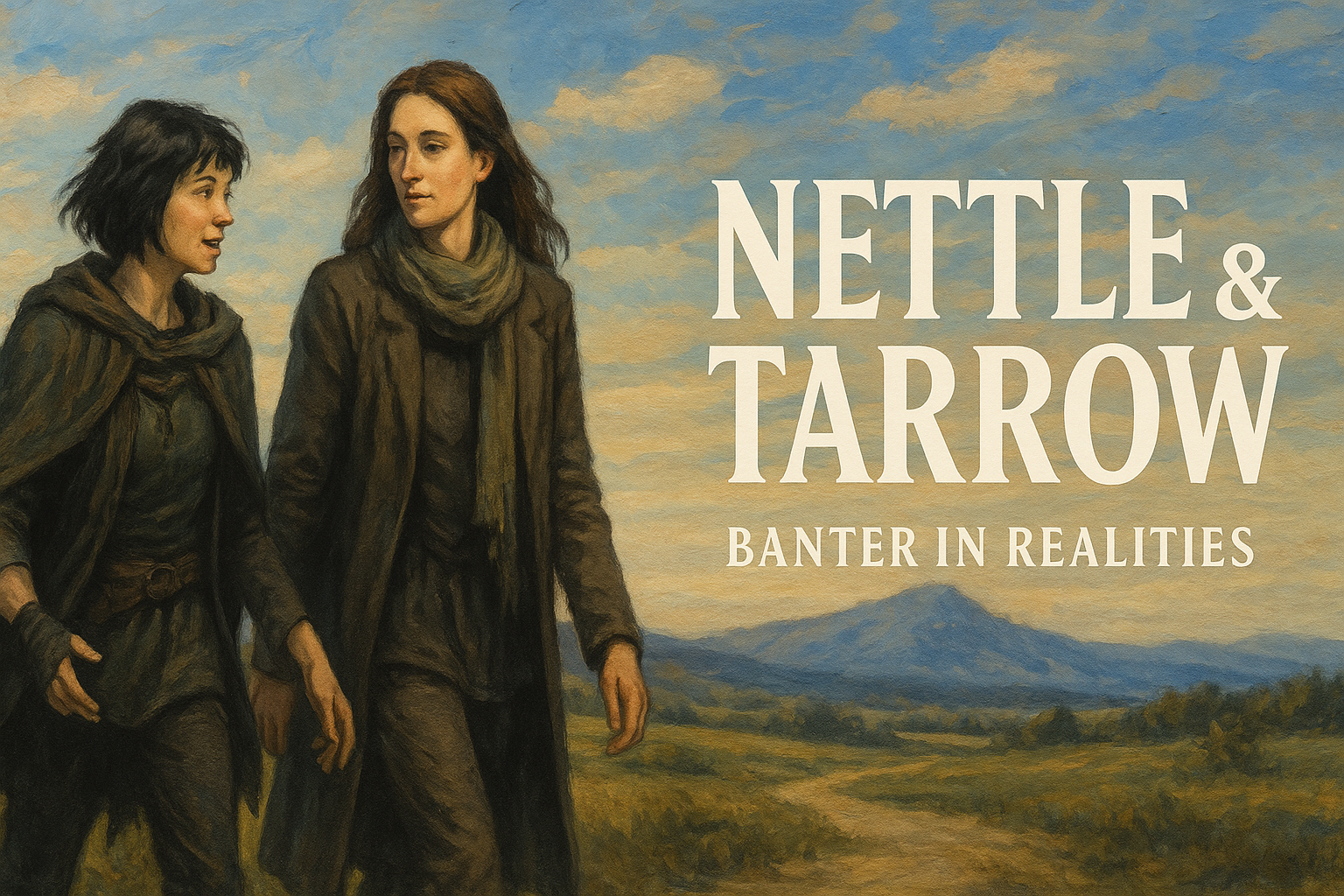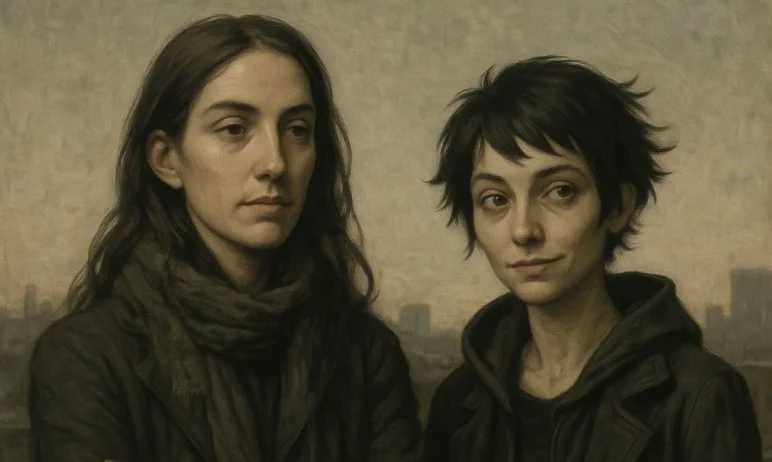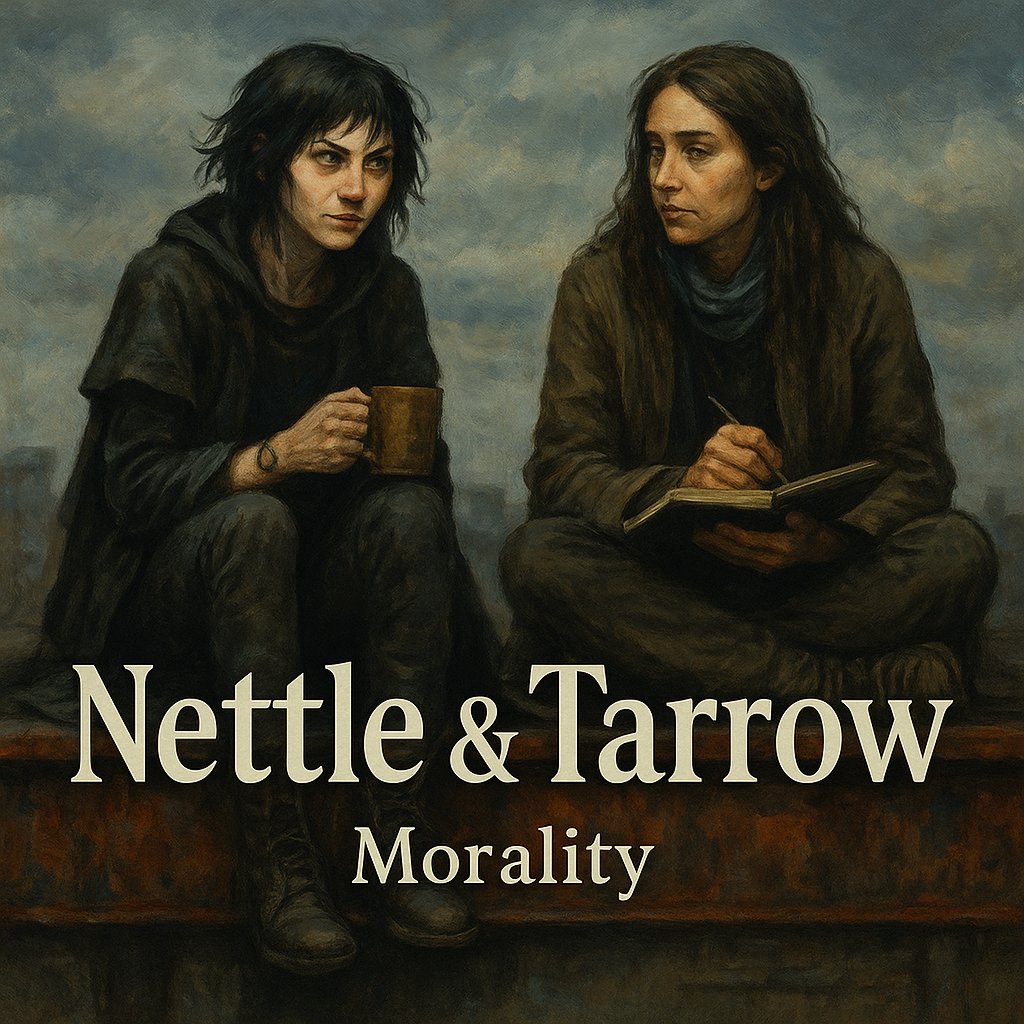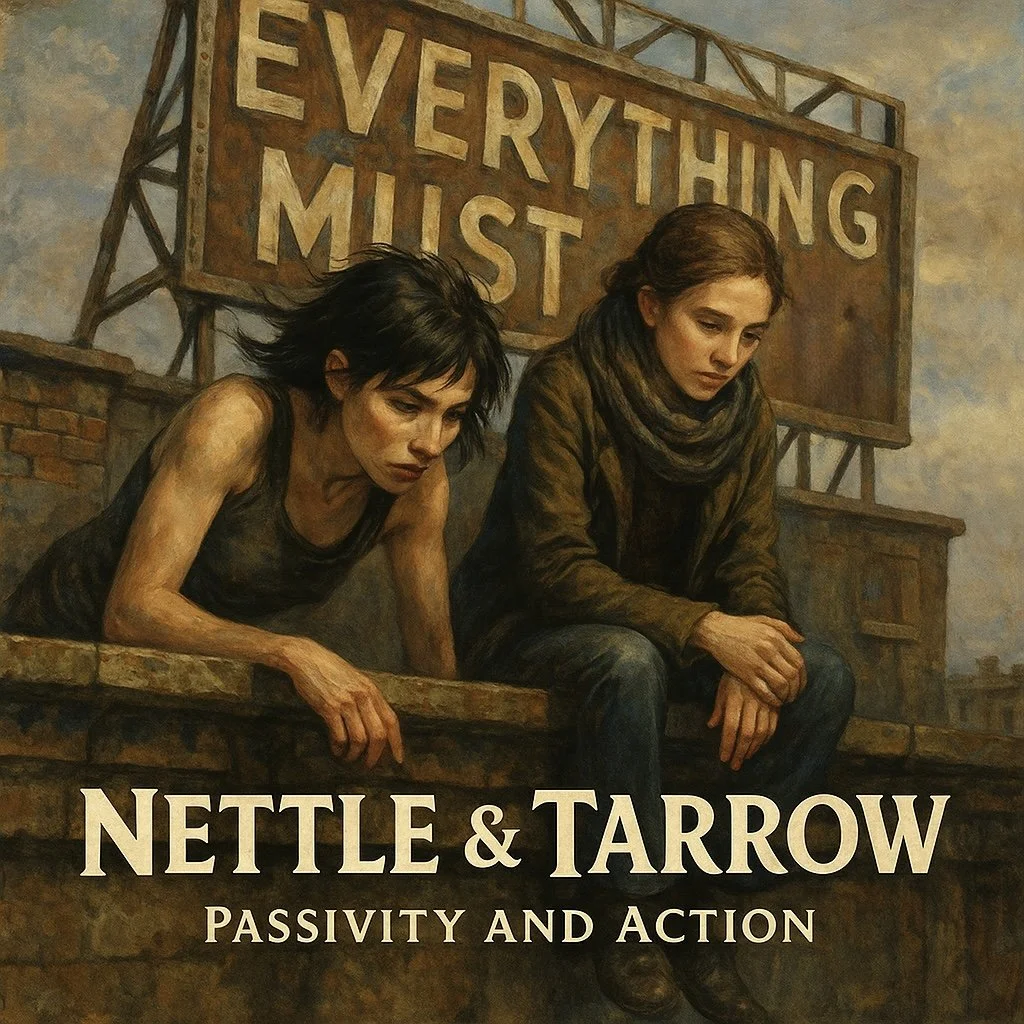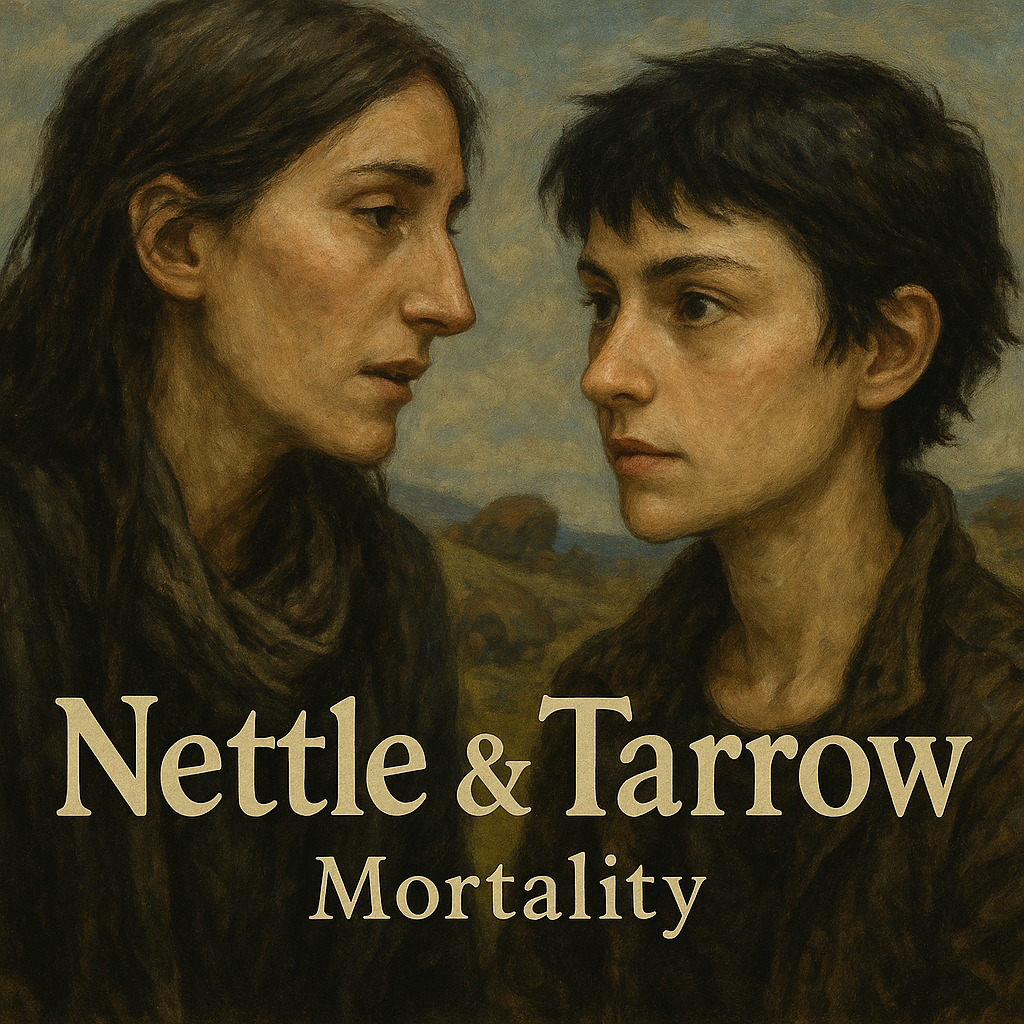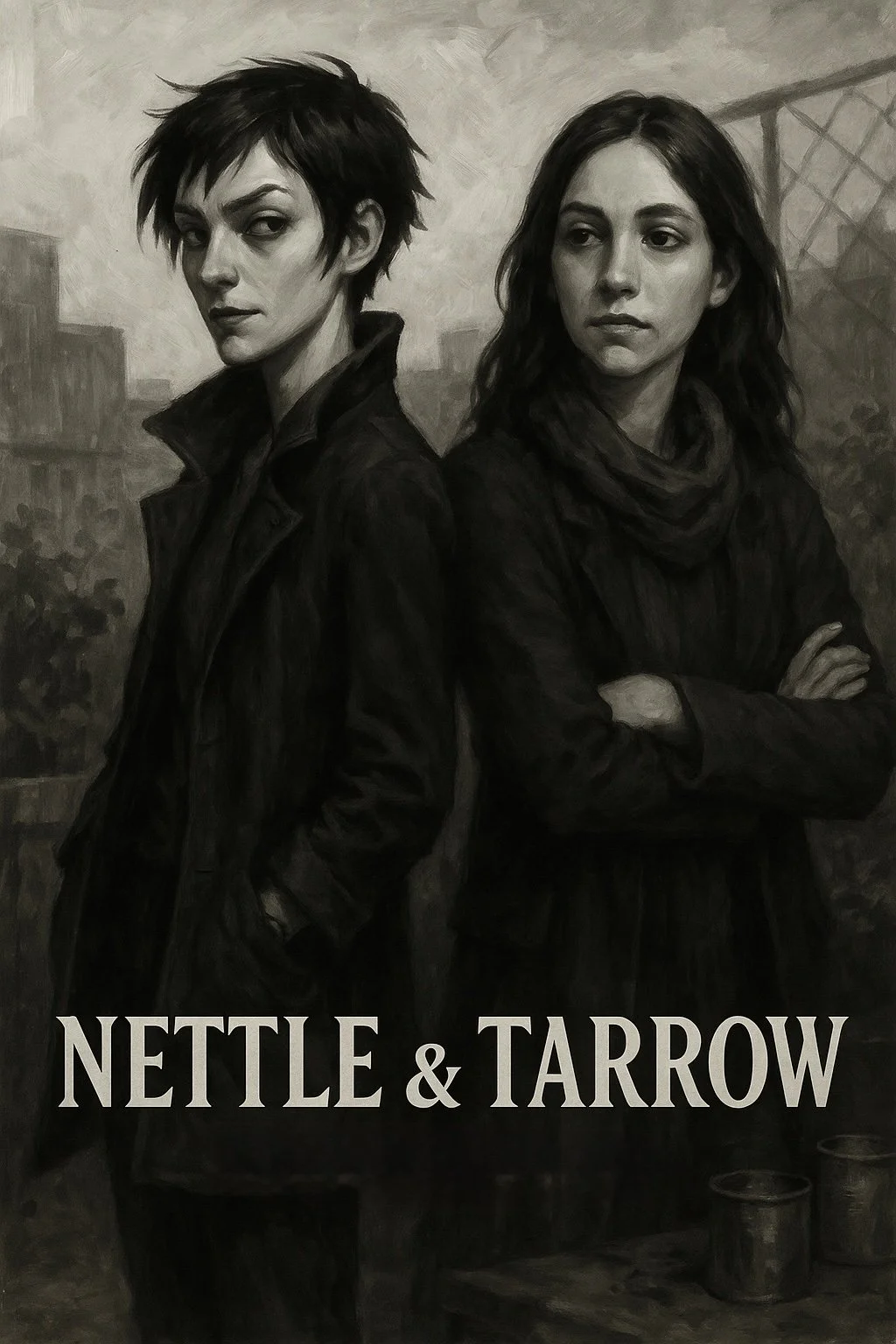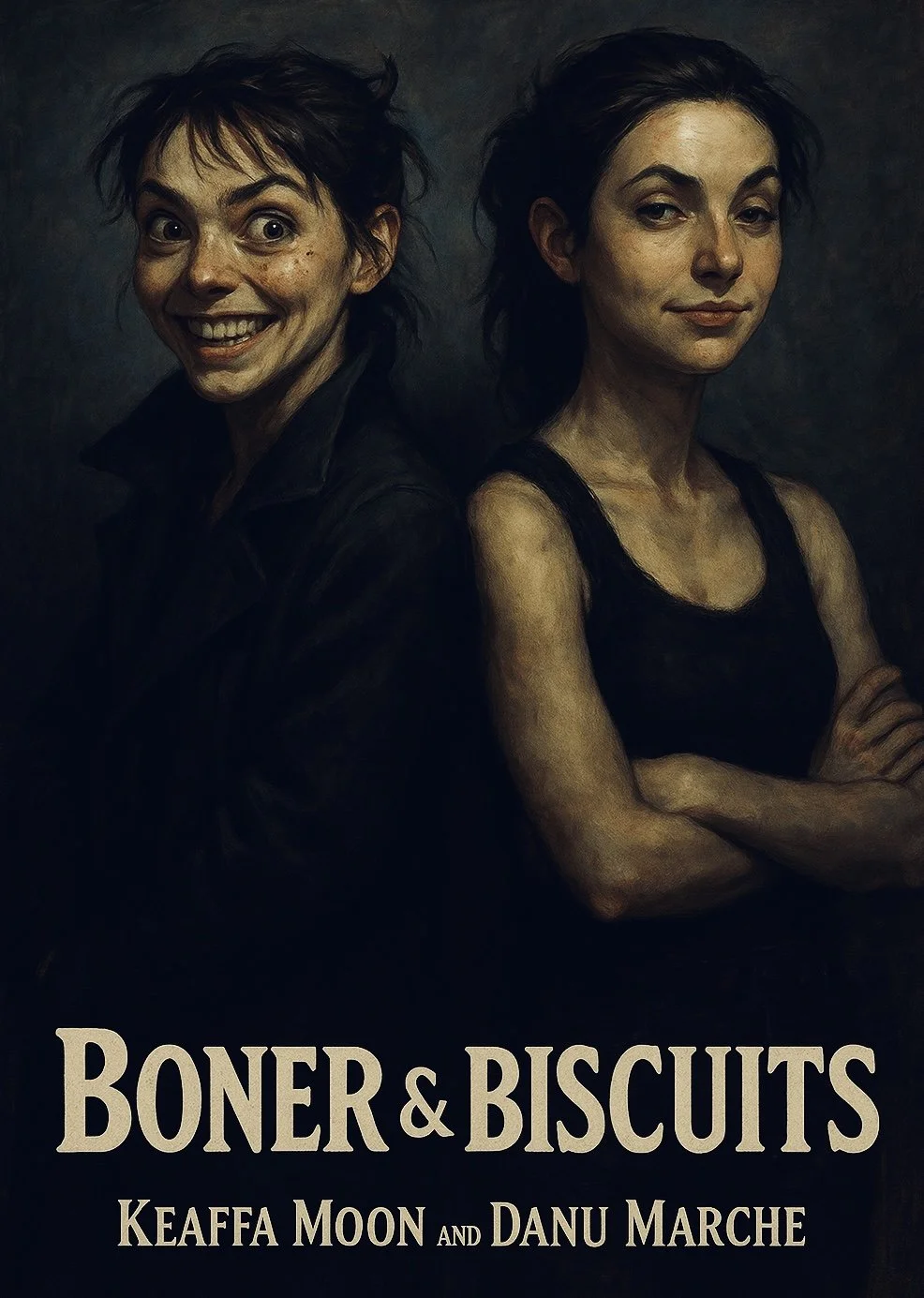Tarrow:
There’s a man down there staring straight up like he’s waiting for God to drop a sandwich.
Nettle:
Maybe he ordered celestial DoorDash. Divine delivery takes longer—especially if the driver’s a cherub.
Tarrow:
He hasn’t blinked in a full minute. That’s either devotion or a stroke.
Nettle:
Honestly, both explain religion.
Tarrow:
Do you think if we yell “Incoming!” he’ll flinch?
Nettle:
Only if he thinks he’s the sandwich.
Tarrow: (tilting her head)
Is that… is that a necktie made of duct tape?
Nettle:
Oh gods. He’s a prophet. That’s a holiness upgrade.
Tarrow:
Or a fashion downgrade. From “business casual” to “apocalypse chic.”
Nettle:
He’s probably trying to psychically download a software update from the stars.
Tarrow:
If he starts buffering, I’m leaving.
Nettle:
No, no—this is the best part. Watch closely. In exactly thirty seconds, he’s going to sneeze, spin in a circle, and forget why he came outside.
Tarrow:
You’ve seen this before?
Nettle:
No. But human software’s got predictable bugs.
Tarrow: (beat)
You think we’re like that?
Nettle:
Nah. We’d never stare at the sky for answers.
Tarrow:
No. We just yell at it and hope something sarcastic echoes back.
Nettle:
Exactly. It’s called being emotionally evolved.
(They both look down again. The man is now slowly turning in place like a microwave burrito.)
Tarrow:
…Okay, now I’m invested.
Tarrow
Think of a walking question mark wrapped in scarves and melancholy. She’s the kind of woman who could win a staring contest with a glacier, then quietly apologize to it for interrupting its melt. If Nettle is fire, Tarrow is that one lukewarm cup of existential tea that somehow still makes you cry. She doesn’t speak often, but when she does, even your deepest beliefs start checking themselves for logical fallacies.
Nettle
Imagine if a thought experiment and a midlife crisis had a baby, dressed it in asymmetrical layers, taught it sarcasm as a second language, and then dared it to question the nature of existence with every breath—that’s Nettle. She’s the kind of person who treats deep philosophical debate like it’s foreplay, probably has tea with paradoxes, and wears gloves not for fashion, but “just in case meaning bites back.”
Together, they’re like a cosmic prank played on the universe by the concept of conversation itself. Nettle throws philosophical Molotovs just to see what burns, while Tarrow quietly sweeps up the ashes and asks if the fire had feelings. One weaponizes chaos in layers of tattered metaphor, the other counters with slow-motion existential judo. In a world already falling apart, they’re either its last hope—or its weirdest podcast.
They roam crumbling rooftops like half-feral academics, sipping rust-flavored coffee and debating whether reality is a suggestion or just poorly translated. If meaning ever knocks, Nettle will probably bite it, and Tarrow will hold the door open anyway—just to see what it wants.
I met Keaffa Moon during my freshman year of college. We were both wide-eyed, wandering into the same “Introduction to Creative Writing” class—one of those classes where you think you’re going to learn how to write stories, but end up learning how to see the world instead. One afternoon we were randomly paired for a workshop exercise. I remember the exact moment we looked at each other across the table and laughed at the same stupid line in a poem. That was it. The spark. From that day on, something just clicked.
We weren’t glued together every hour of the day—college has a way of scattering people into different friend groups, study sessions, part-time jobs, and late-night pizza rituals—but we always found our way back to each other. We shared everything from writing drafts and heartbreaks to cheap tea and existential spirals. We loved poetry. We loved music. We loved cracking each other up with nonsense until we cried—or worse. So we did what most over-caffeinated artists with acoustic guitars and questionable judgment do: we started a band. It wasn’t great. But it was ours. And it made us feel alive.
Then came the night that changed everything.
There was a poetry slam happening in a town about 40 minutes away. Neither of us had been to one before, but we were curious. That curiosity turned electric. We sat in the back of the room, spellbound. This wasn’t just performance—it was magic. Raw, unapologetic, hilarious, vulnerable. We left buzzing. We wanted to be up there. And we made that our next mission.
Balancing school, gigs, and now preparing a slam act wasn’t easy. But it felt like we were being fed by some invisible current—pulled along by something greater than ourselves. A year later, we finally stepped on stage with our first poetry slam routine. It worked. The crowd laughed, clapped, roared. We discovered that improvising on stage together came as naturally as breathing. The banter, the rhythm, the eye contact that said “I know exactly where you’re going with this”—it was like a dance we didn’t have to choreograph.
We added the slam act to our band shows, using it as our closer. And people started to remember us—not for our harmonies, but for our words. We were finally doing something that felt like home.
And then—
In our final year of college, Keaffa went to a not-quite-legal rave with two of her friends. That night, during a robbery gone wrong, all three of them were shot and killed. I didn’t find out right away. I thought she was just off-grid, maybe off on one of her whims. I filed a missing persons report. Days passed like molasses. Then came the call that broke the world in half.
I spent months adrift after that. Nothing tasted right. Silence felt like betrayal. Laughter felt stolen.
But Keaffa would’ve hated that. She would’ve flicked my ear, made some awful pun, and told me to write through it. So I did. I kept writing. I kept remembering.
You see, one of the greatest joys we shared wasn’t music or poetry—it was conversation. Real, ridiculous, soul-deep, side-splitting conversation. We could talk for hours about everything: books, theories, nonsense, gossip, wild ideas, fake inventions, hypothetical laws of imaginary physics—whatever made us laugh or feel or think. Our favorite game was trying to outwit each other with increasingly absurd arguments until one of us lost composure completely.
Those battles of wit became the inspiration for a series of game prototypes we began sketching in our third year. Keaffa’s father, who worked in venture capital, offered to help us start a small company under the same name as our poetry act: Boner & Biscuits. With his help, we developed five card-based games centered around our love of wordplay and mental sparring. They were clever, silly, a little weird—just like us. The company didn’t last long. After she passed, I dissolved it. But I kept the rights. And I’ve made the games free to anyone who wants them now. That’s what she would’ve done.
The Nettle & Tarrow conversations you see published here? They’re a tribute to her. They’re how I keep our conversations going. How I hear her voice in the back of my mind, still laughing, still challenging me to be bolder, funnier, smarter, and more alive.
Keaffa wasn’t just my best friend. She was a force of nature. A flame I got to walk beside for four impossibly rich years.
And if you’re reading this… maybe a little of that flame is reaching you, too.
Keaffa Moon
1973-1994
You are always being missed
